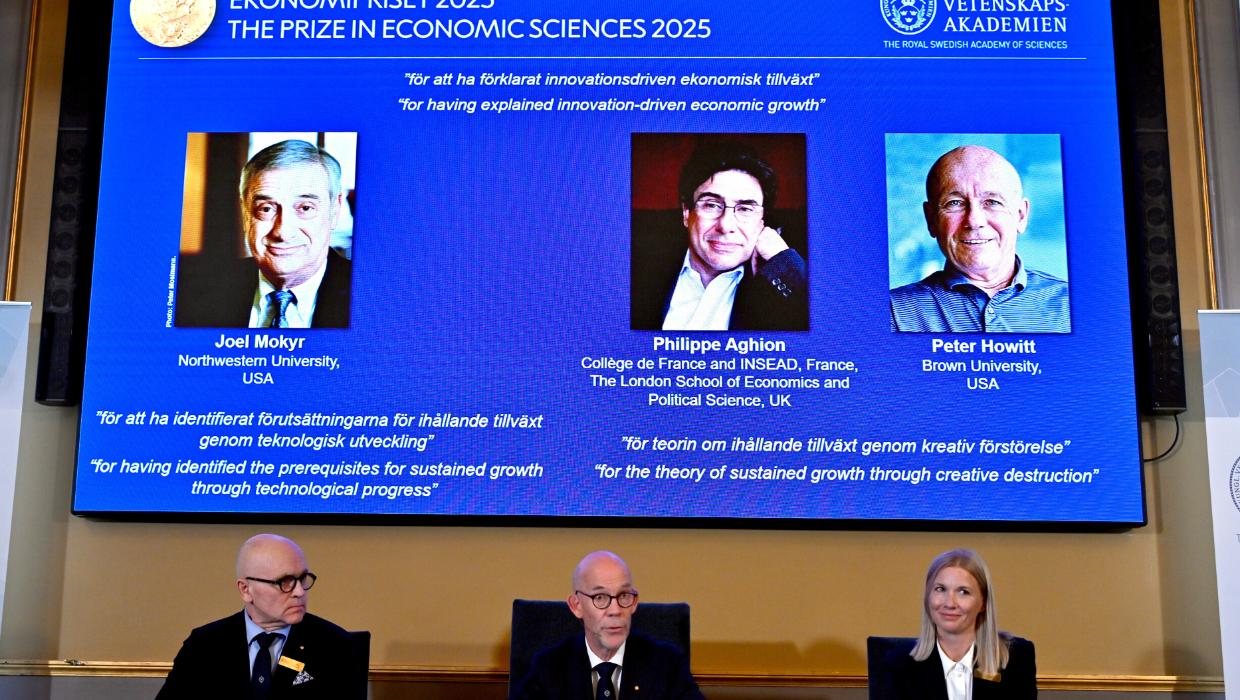Science
Economists Win Nobel Prize for Insights on Creative Destruction

Three economists have been awarded the Nobel Memorial Prize in Economic Sciences for their influential research into the phenomenon of “creative destruction,” a concept central to understanding how innovation fuels economic growth. The prize, announced in Stockholm on March 15, 2024, recognizes the work of Dutch-born Joel Mokyr, 79, from Northwestern University; Philippe Aghion, 69, from the Collège de France and the London School of Economics; and Canadian-born Peter Howitt, 79, from Brown University. Their findings underline how new products and technologies can foster growth while rendering older business models obsolete.
The Nobel committee highlighted the trio’s pivotal role in clarifying and quantifying the process of creative destruction. Coined by economist Joseph Schumpeter in his 1942 work “Capitalism, Socialism and Democracy,” this term describes how new innovations replace outdated technologies and companies. Mokyr’s contributions have emphasized the necessity of understanding the scientific principles behind successful innovations, stating, “If innovations are to succeed one another in a self-generating process, we not only need to know that something works, but we also need to have scientific explanations for why.”
Aghion and Howitt elaborated on the mechanisms that underpin sustained economic growth, presenting a complex mathematical model in a 1992 article that introduced new dimensions to the understanding of creative destruction. Their model indicates that markets dominated by a few large companies may stifle innovation, a concern relevant to industries like telecommunications and social media.
The committee chair, John Hassler, remarked, “The laureates’ work shows that economic growth cannot be taken for granted. We must uphold the mechanisms that underlie creative destruction to avoid stagnation.” Aghion and Howitt have also emphasized the importance of supporting individuals adversely affected by innovation, advocating for policies that facilitate transitions to more productive roles rather than merely protecting existing jobs.
Mokyr has been a steadfast advocate for the potential of technological innovation, countering a prevailing pessimism among some economists regarding the economic impact of recent advancements like smartphones and the internet. He argued that the benefits of these innovations, although sometimes difficult to quantify, have been significant. He pointed to the music streaming service Spotify as an example of transformative innovation that has reshaped consumption patterns, allowing vast access to music for a nominal fee compared to previous physical formats.
The Nobel Prize, which carries a monetary award of 11 million Swedish kronor (approximately $2.02 million), is shared by Mokyr, who receives half, while Aghion and Howitt split the remaining amount. The winners will also receive an 18-carat gold medal and a diploma. The award is formally known as the Bank of Sweden Prize in Economic Sciences in Memory of Alfred Nobel and has been awarded since 1968.
In light of current global challenges, the relevance of innovation has never been more pronounced, particularly in Europe. Aghion pointed out the need for Europe to enhance its innovation capabilities to keep pace with the U.S. and China. He stressed the importance of fostering research and venture capital investment to transform new ideas into viable businesses. “We have to wake up,” he stated, emphasizing that those who innovate will prevail in the competitive landscape.
As discussions surrounding artificial intelligence continue, Aghion acknowledged its vast growth potential but cautioned that the effectiveness of AI will depend on the regulatory frameworks established. Mokyr dismissed fears that AI could lead to mass unemployment, viewing it instead as a powerful tool to enhance human productivity. “They move us to more interesting, more challenging work,” he affirmed.
Both Aghion and Mokyr experienced moments of surprise upon learning of their Nobel win. Mokyr recounted how he received the news early in the morning, feeling bewildered as he processed the congratulatory messages. He remarked, “I think I sat there for 15 minutes, sort of dazed.” Howitt, initially skeptical upon receiving a call from a Swedish reporter, humorously noted the lack of champagne to celebrate the unexpected honor.
The Nobel Prize not only recognizes individual achievement but also highlights the importance of understanding the dynamics of economic innovation. As the global economy continues to evolve, the insights provided by these esteemed economists will likely shape discussions on how to navigate the complexities of modern economic challenges.
-

 World4 months ago
World4 months agoTest Your Knowledge: Take the Herald’s Afternoon Quiz Today
-

 Sports4 months ago
Sports4 months agoPM Faces Backlash from Fans During Netball Trophy Ceremony
-

 Lifestyle4 months ago
Lifestyle4 months agoDunedin Designers Win Top Award at Hokonui Fashion Event
-

 Entertainment4 months ago
Entertainment4 months agoExperience the Excitement of ‘Chief of War’ in Oʻahu
-

 Sports4 months ago
Sports4 months agoLiam Lawson Launches New Era for Racing Bulls with Strong Start
-

 World5 months ago
World5 months agoCoalition Forms to Preserve Māori Wards in Hawke’s Bay
-

 Lifestyle4 months ago
Lifestyle4 months agoDisney Fan Reveals Dress Code Tips for Park Visitors
-

 Health4 months ago
Health4 months agoWalking Faster Offers Major Health Benefits for Older Adults
-

 Politics4 months ago
Politics4 months agoScots Rally with Humor and Music to Protest Trump’s Visit
-

 Top Stories5 months ago
Top Stories5 months agoUK and India Finalize Trade Deal to Boost Economic Ties
-

 Health2 months ago
Health2 months agoRadio Host Jay-Jay Feeney’s Partner Secures Visa to Stay in NZ
-

 World5 months ago
World5 months agoHuntly Begins Water Pipe Flushing to Resolve Brown Water Issue









